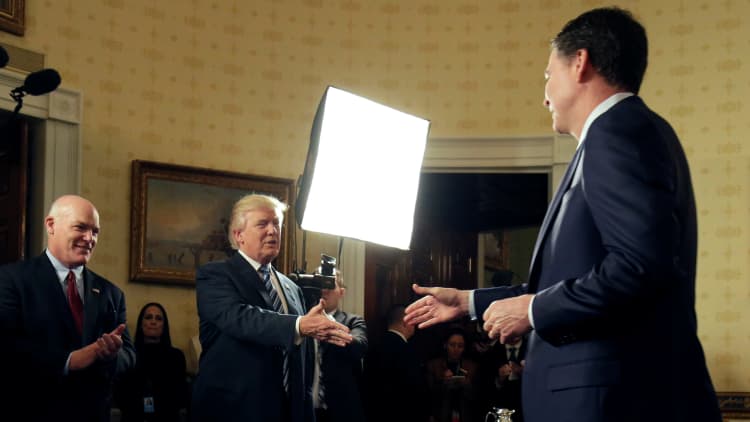
A key House Republican asked the FBI on Tuesday for any records it has on communications between former FBI Director James Comey and President Donald Trump.
The move by House Oversight Committee Chairman Jason Chaffetz follows reports, confirmed by NBC News, that Comey says in a memo that Trump asked him to end the probe into former national national security adviser Michael Flynn.
In a letter to acting FBI Director Andrew McCabe, Chaffetz requested "all memoranda, notes, summaries and recordings referring or relating to" communications between Comey and Trump by May 24. He wrote that the reports Tuesday "raise questions as to whether the president attempted to influence or impede the FBI's investigation" related to Flynn.
Trump fired Comey last week. The ouster came as the FBI is investigating Russian meddling in the 2016 election, including any possible ties between Trump campaign associates and the Kremlin.
The timing of Comey's ouster — and comments Trump later made to NBC News — raised questions about whether the president had tried, or would make an attempt, to impede the probe.
Earlier Tuesday, Chaffetz tweeted that his panel "is going to get the Comey memo, if it exists." The Utah Republican said he has his "subpoena pen ready."
Chaffetz, who has a key role in executive branch oversight, recently announced he would not run for re-election next year. A spokeswoman for House Speaker Paul Ryan said that requesting the memo is "appropriate," according to NBC News.
Comey wrote in the February memo that Trump asked him to back off the investigation into Flynn, NBC confirmed Tuesday with multiple sources.
It was written the day after Flynn resigned following revelations that he misled Vice President Mike Pence about the nature of his conversations with the Russian ambassador to the United States, according to NBC.
"I hope you can see your way clear to letting this go, to letting Flynn go," Trump told Comey, according to the memo the former FBI director penned soon after the meeting. The existence of the memo was first reported by The New York Times.
In a statement provided to NBC News, a senior White House official pushed back against the reports.
"While the president has repeatedly expressed his view that General Flynn is a decent man who served and protected our country, the president has never asked Mr. Comey or anyone else to end any investigation, including any investigation involving General Flynn. The president has the utmost respect for our law enforcement agencies, and all investigations. This is not a truthful or accurate portrayal of the conversation between the president and Mr. Comey," the official said in a statement.

Acting FBI Director Andrew McCabe told Congress last week that "there has been no effort to impede our investigation to date." It is not clear whether he knew about the memo.
Separately on Tuesday, all of the Democrats on the House oversight and judiciary committees called for an investigation into the actions of Trump, Attorney General Jeff Sessions and top administration officials.
They said they wrote a letter to the GOP chairmen of those panels saying that they should "already be conducting a robust investigation of these issues that includes public hearings, documents requests and interviews and depositions."


